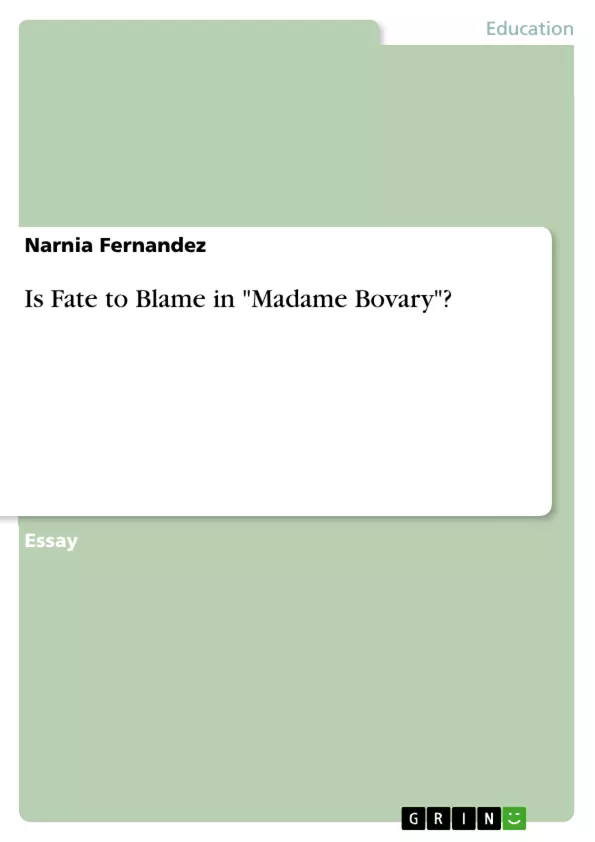In Gustave Flaubert’s novel Madame Bovary the heroine Emma Bovary commits suicide in the end after going broke and being rejected by her lovers. Years after that, her husband Charles meets Rudolphe, one of her lovers, but Charles does not blame him for her death, but “fate.” By definition, fate is the development of events outside a person’s control, regarded as predetermined by a supernatural power and leading thus to the inescapable death of a person. In order to determine whether or not fate is to blame, one has to consider the events that led to Emma’s death and if they are based on her own decisions:
Inhaltsverzeichnis (Table of Contents)
- Is Fate to Blame in Madame Bovary?
Zielsetzung und Themenschwerpunkte (Objectives and Key Themes)
This essay examines whether fate is to blame for the tragic death of Emma Bovary in Gustave Flaubert's novel, Madame Bovary. It analyzes Emma's choices and the impact of external factors, particularly the actions of the men in her life.
- Emma's choices and their consequences
- The role of external factors in Emma's life
- The responsibility of the men in Emma's life for her fate
- Emma's mental health and its impact on her decisions
- The concept of fate and free will in the novel
Zusammenfassung der Kapitel (Chapter Summaries)
The essay begins by establishing the context of Emma Bovary's suicide and the question of whether fate is to blame. It then examines Emma's initial decision to marry Charles Bovary and her subsequent dissatisfaction with him. This dissatisfaction stems from her romanticized expectations of marriage, fueled by her exposure to romantic fiction. To cope, Emma begins making purchases for the house, ultimately leading her to borrow money from the pharmacist Lheureux without Charles' knowledge. Despite Charles' awareness of the debt, he chooses not to confront Emma, prioritizing her happiness.
The essay further explores Emma's relationships with Léon and Rudolphe, highlighting Charles' role in facilitating these encounters. Emma's decision to engage in an affair with Rudolphe is ultimately fueled by his abandonment of her. The essay notes that Emma's eventual financial troubles, exacerbated by Lheureux's insistence on repayment, further contribute to her desperation.
The essay concludes by analyzing Emma's final decision to commit suicide, highlighting her suicidal tendencies and neglect of her daughter.
Schlüsselwörter (Keywords)
The key themes and concepts explored in this essay include fate, free will, decision-making, responsibility, love, marriage, infidelity, financial hardship, and mental health. These concepts are interwoven within the analysis of Emma Bovary's life and tragic demise.
Frequently Asked Questions
Is fate responsible for Emma Bovary's suicide?
While Charles Bovary blames "fate," the essay analyzes whether Emma's death was actually the result of her own predetermined path or a series of her own choices and mental health struggles.
How did Emma's romantic expectations affect her life?
Emma's exposure to romantic fiction led to unrealistic expectations of marriage. Her dissatisfaction with Charles drove her toward infidelity and excessive spending to cope with her boredom.
What role did the men in Emma's life play in her tragic end?
The essay examines how Charles' passivity, Rudolphe's abandonment, and Léon's inability to save her contributed to her desperation. Each man influenced the external factors that led to her financial and emotional collapse.
How did financial debt contribute to Emma Bovary's death?
Emma borrowed large sums of money from Lheureux to fund her lifestyle. When she went broke and was rejected by her lovers for financial help, the inescapable debt became a primary trigger for her suicide.
What is the distinction between fate and free will in the novel?
The essay explores whether Emma's actions were predetermined by a supernatural power (fate) or if they were the consequence of her free will and the social environment of the time.
Did Emma Bovary suffer from mental health issues?
Yes, the analysis highlights Emma's suicidal tendencies and her general neglect of her responsibilities, suggesting that her mental state played a crucial role in her final decision.
- Citation du texte
- Narnia Fernandez (Auteur), 2012, Is Fate to Blame in "Madame Bovary"?, Munich, GRIN Verlag, https://www.grin.com/document/212634



